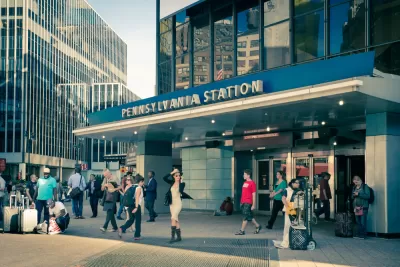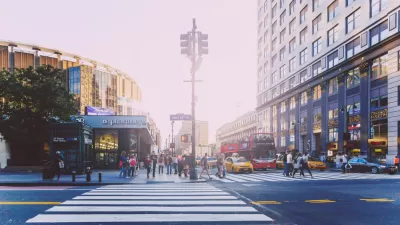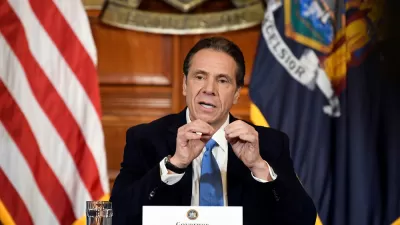Empire State Redevelopment unanimously voted to support the planned redevelopment of Midtown Manhattan’s much-maligned Penn Station.

New York City’s economic development agency has approved a plan for the redevelopment of Penn Station and surrounding area, reports Kristine Klein in The Architect’s Newspaper. “Under the approved plan most of the new constructions in the so-called Empire Station Complex will be dedicated to commercial space, including offices and retail, spread across 10 skyscrapers to form an office-centric neighborhood on par with nearby Hudson Yards. The plan also includes 1,800 housing units, a hotel, and a long-overdue renovation to Penn Station, recently dubbed a ‘hellhole’ by [New York governor Kathy] Hochul.”
“The proposed reconstruction of Penn Station will include cosmetic upgrades, the reconfiguration of the train hall serving NJ Transit and Long Island Rail Road, subway improvements, and the construction of a rail tunnel under the Hudson River, all estimated to cost $7 billion, with the surrounding redevelopment proposal increasing the cost another $13 billion.” The project will connect to the new Moynihan Train Hall.
According to the article, “With the ESD’s approval an application can now be made for federal funding to assist with the costs of the project’s development. However, who will dish out the money for the megaproject is still not confirmed.” Neither is a design: “The ESD has not released a Request for Proposals (RFP) for the larger design scheme; last month the State formally commenced an RFP seeking architecture and engineering firms to execute the outlined design work at Penn Station.”
After a design is finalized, the project will need to be approved by the Public Authorities Control Board and, if a state bill introduced last June passes, undergo the city’s Uniform Land Use Review Procedure (ULURP).
FULL STORY: Empire State Development board approves overhaul for Penn Station and its circumambient neighborhood

Maui's Vacation Rental Debate Turns Ugly
Verbal attacks, misinformation campaigns and fistfights plague a high-stakes debate to convert thousands of vacation rentals into long-term housing.

Planetizen Federal Action Tracker
A weekly monitor of how Trump’s orders and actions are impacting planners and planning in America.

Chicago’s Ghost Rails
Just beneath the surface of the modern city lie the remnants of its expansive early 20th-century streetcar system.

Bend, Oregon Zoning Reforms Prioritize Small-Scale Housing
The city altered its zoning code to allow multi-family housing and eliminated parking mandates citywide.

Amtrak Cutting Jobs, Funding to High-Speed Rail
The agency plans to cut 10 percent of its workforce and has confirmed it will not fund new high-speed rail projects.

LA Denies Basic Services to Unhoused Residents
The city has repeatedly failed to respond to requests for trash pickup at encampment sites, and eliminated a program that provided mobile showers and toilets.
Urban Design for Planners 1: Software Tools
This six-course series explores essential urban design concepts using open source software and equips planners with the tools they need to participate fully in the urban design process.
Planning for Universal Design
Learn the tools for implementing Universal Design in planning regulations.
planning NEXT
Appalachian Highlands Housing Partners
Mpact (founded as Rail~Volution)
City of Camden Redevelopment Agency
City of Astoria
City of Portland
City of Laramie





























